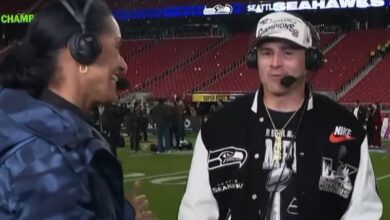Less than three months ago, Laurent Duvernay-Tardif was celebrating the Chiefs Super Bowl victory with his teammates. Now the medical doctor is helping fight the coronavirus outbreak at a long-term care facility in Quebec.
The offensive lineman shared his first-person story with “Sports Illustrated” (the entire story is available here).
“Three days before Super Bowl LIV in February, a reporter asked what I thought about the coronavirus. Crazy, right? Back then, I had read a little and knew what type of virus it was and that there were a few thousand cases in China. I told the reporter as much, but added that I was trying to focus on football going into the biggest game of my life.
“After my team triumphed, I went back to the parade in Kansas City, which is totally inconceivable right now. Adding a million people in the streets? Piled up on top of each other? Drinking and cheering in subzero temps? It’s so wild to even think back to then, this time two months ago that feels like another lifetime.
“I went back to Montreal after the celebration. Life was chaotic then, but in a different way. I had two hectic weeks of appearances, including my own parade in Montreal, where like 4,000 people showed up in the snow to cheer me on. To see that community of Chiefs fans north of the border was touching for me.
“I hold a doctorate in medicine. I don’t have a specialty yet, and I haven’t done the residency portion of the program. And while I don’t watch many games on television, I do know how big of an industry sport is. When the NBA halted its operation and so did the NHL, it really hit me. I remembered the reporter from the Super Bowl and her question.
“Soon into the crisis, I started to ask how I could help. I reached out to the health ministry and public health authorities, but found out that I fell into a gray area where they didn’t know what to do with me, because I don’t have a license to practice — yet. In the interim, officials briefed me on an almost daily basis, and I used my platform and credentials to relay their messages. In Montreal, for a while, the age group most infected was people between 20 and 29, so there was an issue with enforcing those social distancing measures. I tried to reinforce the need for them. I was assigned to a long-term care facility near my hometown, Saint-Jean-sur-Richelieu, which is about an hour from Montreal.
“It’s wild to think that just 10 weeks earlier I played in the biggest game in sports. I was reminded of that even at the facility, when one of the people training me turned and said, `You’re the football player, right?’ When I answered yes, he said, “Bro, you just won the Super Bowl.’ Indeed, I told him, and now I just want to help.
“Playing in the Super Bowl vs. heading back to the medical system during a pandemic is totally different. Back in February, I knew that 100 million-plus people were going to be watching, and I wanted to win. When you’re going in to help, it’s more about your duty as a doctor and a citizen. It’s not the time to be the hero and be impulsive. You’ve gotta do it the right way. You’ve gotta really take this seriously when it comes to washing your hands, not touching anything. I know it sounds silly; it’s simple stuff. But when you’re in a long-term care facility where there are cases, you know for sure you’re going to be exposed if you don’t take those appropriate measures. You know there’s risk involved
“It’s too soon to say when sports might come back. Or what that might look like. What I can say is if we’re not playing in September, knowing all the implications of what sport means for a nation and the money behind this huge industry, there are going to be bigger issues than not playing football.”
–Alan Goforth | Metro Voice








